Set your sights on an international career with the Energy Engineering Specialization: an internship in Saudi Arabia at the heart of energy auditing
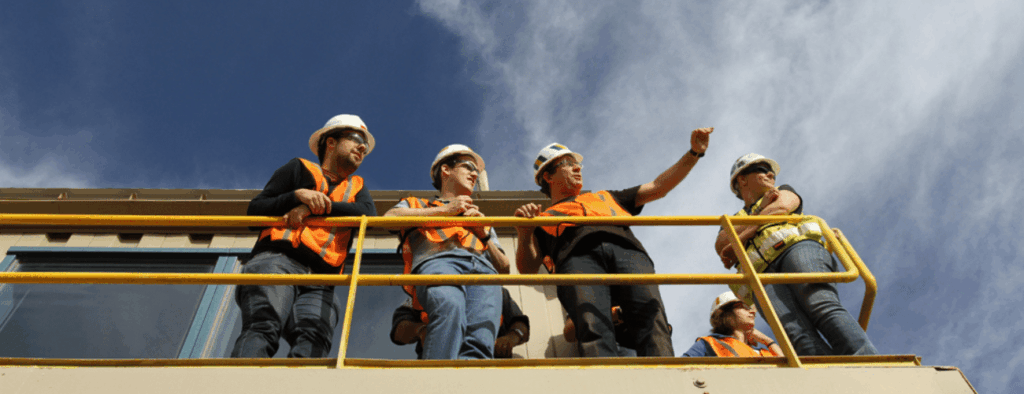

During the summer of 2024, Omar joined the energy audit team at ENGIE Energie Solution et Service (EESS) AMEA in Riyadh, Saudi Arabia, for a four-month assignment (July to October). He chose this destination because he wanted to get back to the fundamentals of energy and because he had always wanted to discover a country and culture that had intrigued him for a long time.
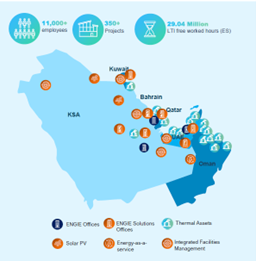
ENGIE AMEA’s activities and implementation in all Gulf countries
On site, Omar was fully involved in responding to calls for tenders for energy renovation projects, mainly commissioned by the government entity Tarshid, as part of the kingdom’s “Vision 2030” project, one of the objectives of which is to reduce the country’s environmental impact related to electricity consumption.

Saudi government entity responsible for the global energy efficiency program throughout the kingdom, as part of Vision 2030.
His mission: analyze consumption data collected on site, develop electricity consumption models linked, among other things, to the use of HVAC installations, identify savings levers and assess their technical and economic feasibility. This rigorous work is summarized in technical reports submitted to the client.
He says: “This experience allowed me to work on real energy audit case studies for fairly large-scale projects (university and hospital sites, etc.) alongside true experts in the field. It allowed me to develop the right reflexes for conducting this type of study. I also learned about international scientific conventions and regulations and practices outside Europe.”
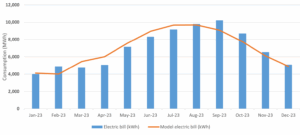
Breakdown of a site’s consumption in kWh per month for one year, based on the electricity bill (meter data), compared to our consumption model.
Thanks to this immersion, Omar consolidated the theoretical knowledge he had acquired during his training, particularly in the areas of energy auditing, data processing, international units of measurement, and non-European regulatory standards. He particularly highlights the direct usefulness of the skills he developed during his training: energy analysis (thermodynamics applied to cooling systems, high-power electricity, etc.), statistical tools, project management, and collaborative work.
He says: “My two years of apprenticeship experience prior to the internship also taught me a lot about integrating into a professional office environment, even during a relatively short four-month internship compared to others. International assignments generally last six months, but can be up to a year for students on a career break, for example.”
The intercultural aspect was central to this assignment. He talks about how enriching such an assignment is for a future engineer: “This immersion challenges you to socialize, integrate, and adapt to a completely different environment. As engineers, we may be confronted with situations in which we have to interact with foreign service providers, and being confronted with this situation during the internship allows us to learn the codes and reflexes that facilitate communication. I’m also thinking about the language barrier, which can be quite unsettling if we’ve only ever worked in French. This experience demonstrates our ability to be versatile, to use our human qualities to facilitate teamwork, etc.”
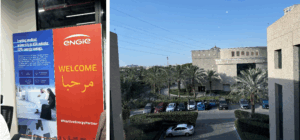
Welcome poster at the entrance to the EESS office in Riyadh and view from the office windows.
Working in a multinational team, communicating in a different linguistic context, adapting to a new professional environment: these are all challenges that Omar has taken on with commitment, as his mentor Choukri Ben Mechichi, Implementation Team Manager, EESS AMEA, explains: “Omar has shown strong commitment and total immersion in this new environment. He has been more than competent. He was part of the energy audit team in the engineering department. His main role was to assist the energy audit engineers in carrying out the energy audit of the facilities. Omar has developed technical skills such as how to prepare an energy balance for a facility and assess its energy saving potential. In terms of interpersonal skills, he worked in a multinational environment with different engineers and made a great effort to adapt to this new environment. He established strong relationships with all members of the team. This hands-on experience is very interesting because it allows students to come into contact with all energy systems from the ground up.
As Omar confirms: “This experience has reinforced my desire to remain involved in the design phase of the projects I work on, as this is where I feel I can make the most valuable contribution: I am able to invest myself in a way that I enjoy and where I feel most confident.”
This trip to Saudi Arabia was a catalyst: it not only confirmed Omar’s career choices, but also revealed his preference for energy project design:
This experience has allowed me to grow both professionally and personally. Despite my fears and preconceptions, I managed to embrace this opportunity and make the most of it in order to grow as a person.
Elise El Ahmar, Director of Studies for the ISUPFERE program, concludes: “Omar’s career path perfectly illustrates the philosophy of our apprenticeship program: combining scientific rigor, professional immersion, and openness to the world. His internship in Saudi Arabia certifies our students’ ability to adapt to professional environments with multiple challenges, to collaborate in multicultural contexts, and to bring real added value from the moment they graduate. This experience is a fine example of the international dynamic we encourage and the role our future engineers can play in the global energy transition.”
Discover the Energy Engineering Specialization at ISUPFERE
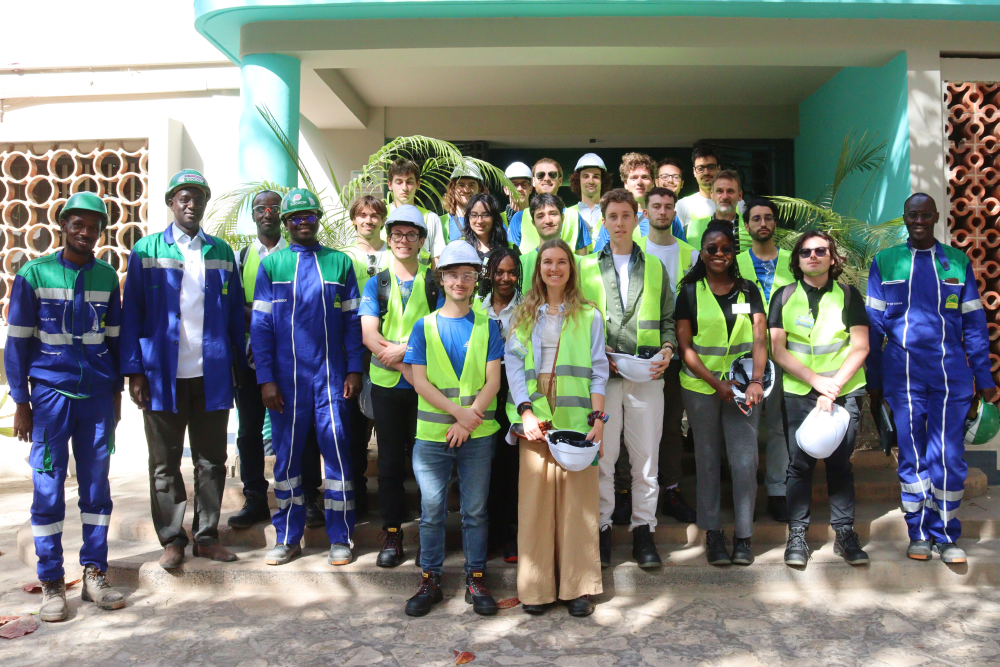
As part of their training at the interface between economics, energy and sustainable development, students in the Specialized Master © in Energy Syste...